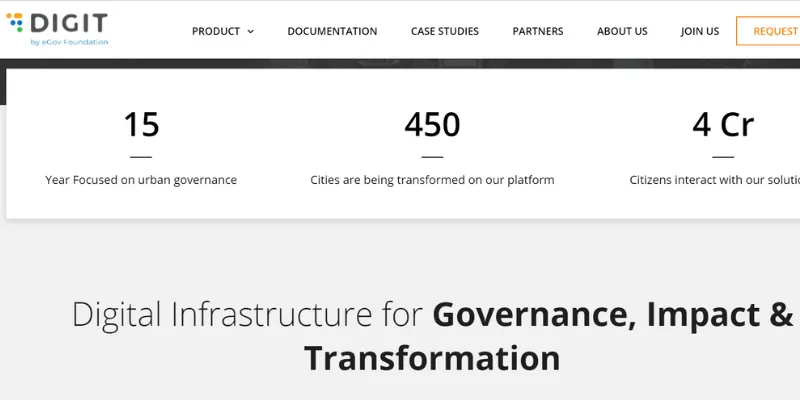How startups are gearing up to address challenges in India’s civic tech ecosystem
An increasing number of entrepreneurs and startups are interested in tackling complex civic problems, particularly in sectors like waste, water, and sanitation.
With India rapidly urbanising, governments across the country are facing several challenges in providing equitable access to various citizen services for a growing urban population. Most urban local bodies (ULBs) are severely under-resourced, and therefore struggle to meet these demands. Fortunately, India’s simultaneous growth as an innovation hub offers the potential to source new and innovative solutions that can address these civic problems.
1563788018483.png?fm=png&auto=format)
Civic technologies, or civic tech, not only enable governments to serve people better but also empower citizens to hold governments and institutions accountable
Across the globe, there is a growing trend to harness technology to bridge the gap between governments and their citizens. Civic technologies, or civic tech, not only enable governments to serve people better but also empower citizens to hold governments and institutions accountable.
In India, there is enormous potential in this space, and it is encouraging to note the increasing number of entrepreneurs interested in tackling complex civic problems, particularly in sectors like waste, water, and sanitation.
Government partnership is key
A key ingredient in the success of any civic tech initiative is that of government support and partnership. In each case, with successful implementations, there have been visionary bureaucrats and supportive politicians involved. Crucially, these government partners have been very generous with their time, allowing civic tech providers to understand their pain points and requirements very well, and configure solutions that best match those needs.
In addition, certain State governments, particularly those of Andhra Pradesh, Telangana, and Maharashtra, have taken an active role in the ecosystem, running startup competitions and challenges that go a long way to support entrepreneurs in their work.m
The impact of government involvement in civic tech can often be dramatic. For instance, the successful implementation of 'Digit', eGov’s open source platform for municipal services in Andhra Pradesh, has seen the number of citizen grievances filed rise ten-fold over a two-year period.

The interface of Digit, an e-governance open source platform for municipal services.
Simultaneously, the time to address these requests has gone down dramatically, and over two thirds of requests are addressed within the time period promised by the government. Further, ULB revenues have grown by over 40 percent annually in the past three years since implementation, providing them the much-needed own source of revenue.
Multiple hurdles
Despite this support, the Indian civic tech space still has substantial hurdles to overcome before it is able to realise the potential of domestic innovation. Government procurement processes and capabilities are not yet geared to the needs of civic tech. Most entrepreneurs are unable to participate in the current Request for Proposal (RFP) process due to an inability to meet the stringent criteria, and are often confounded by the complexities of the process itself.
Moreover, the government needs to better understand the merits of innovation that a civic tech startup can bring to the table. Procurement processes are inherently conservative, and oriented towards reducing risk. Due to a lack of in-house expertise, government contracts are often managed by external consultants whose incentives are not aligned with the government’s own. This may lead to failed implementations, which in turn makes the government more risk-averse and wary of tech solutions.
For startups that are eventually able to participate in government processes, inordinately long payment cycles can be a deterrent. Payments are only released after multiple checks at different levels of the work has been conducted. Furthermore, ambiguity about deliverables under these contracts can lead to additional delays. While such delays can be absorbed by large companies as a cost of doing business with the government, they can be a death knell for startups. Many civic tech startups also operate under regulatory uncertainty as questions about whether they are permitted to even operate remain unanswered.
Support from accelerators and investors
In an encouraging development, accelerators and philanthropic investors have been stepping in to address some of these gaps. While the funding ecosystem is not as developed as it needs to be, and there are still too few funders (both commercial and philanthropic) currently interested in civic tech, the sector has the potential for strong returns as well as outsized impact.
For eg., Nextdoor emerged as the first unicorn in the civic tech space in 2015, but there is the potential for many others to follow suit. Philanthropic support via grants or blended finance will continue to be critical until such time as viable business models emerge in this space and governments are able to become effective buyers of civic tech solutions.
A growing number of accelerators and incubators are also encouraging startups to emerge and promote greater collaboration between them and buyers from government.
However, there are several such initiatives in existence now, including the Palava accelerator and Ashoka University’s Smart City accelerator. These accelerators can play a strong role in helping startups to develop business models that ensure the sustainability of the sector. They can also help to connect demand on the part of government and political leaders, with a supply of innovative solutions by startups. Finally, they can advocate for policies to address some of the barriers mentioned above and accelerate the pace at which the sector expands.
Bharath Visweswariah is Director of Investments, Omidyar Network India, managing the firm’s governance and citizen engagement portfolio. Omidyar has been pioneering civic tech work globally, including partnering with organisations like Code for America (United States), Amandla.mobi (South Africa), and eGovernments Foundation (India). Visweswariah is a mentor at WRI’s TheCityFix Labs India.

1563788501985.jpg?mode=crop&crop=faces&ar=2%3A1&format=auto&w=1920&q=75)







